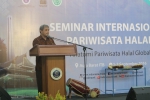Smart Development in Tourism: Integration Between Tourism and Technology

BANDUNG, itb.ac.id – The concept of a smart city is not new; it involves the application of technology in urban areas. But what if this concept were to be implemented in the tourism industry? Therefore, the School of Architecture, Planning, and Policy Development (SAPPD) at ITB organized a discussion on this topic during the International Virtual Course Winter School 2023 on Friday (15/09/2023).
This event took place online at the Zoom Meeting. Dr.Eng. Maya Safira, S.T., M.T., a lecturer at SAPPD ITB, served as a speaker and presented a topic on Smart Development in Tourism. This topic emphasizes the importance of smart and sustainable tourism.
Smart tourism development refers to the strategic and sustainable integration of information and communication technology, data-based knowledge, and innovative solutions to enhance the tourism industry. It involves the utilization of digital tools, connectivity, and smart infrastructure with the aim of creating a more efficient, enjoyable, and responsible travel experience for tourists while also promoting long-term economic prosperity, environmental sustainability, and social well-being in the destination.
Smart tourism encompasses various aspects, including digital connectivity, data analytics, the integration of information and communication technology, smart infrastructure, tourist participation, sustainability, public involvement, safety, cultural preservation, marketing, and promotion. "All these components must be well integrated to achieve success in the development of a smart tourism destination," Dr. Maya stated.

The tourism industry heavily relies on information, making an understanding of technological shifts and tourist behavior crucial. Information and communication technology enable people to easily share their opinions and creativity, establishing a strong link between travel and technology.
"A concrete example of a smart tourism destination is Sentosa Island in Singapore. This island combines technology with natural scenery and entertainment, offering high-speed internet connectivity, smart transportation, and digital interactive tools that enhance visitors' experiences," she said.
Furthermore, Sentosa Island utilizes Augmented Reality (AR) and Virtual Reality (VR) technology in some places, such as Universal Studios, and is committed to sustainability by using solar power and other eco-friendly practices. Sentosa Island has gained recognition for its smart tourism initiatives.
Despite the various benefits, the development of smart tourism faces multiple challenges. Some of the most significant challenges include the high cost of implementing smart technology, digital inclusivity for tourists, safeguarding visitors' data privacy, system maintenance and compatibility, as well as finding a balance between modernization and the preservation of culture and environment.
Addressing these challenges requires suitable strategies, such as collaboration among stakeholders, allocating adequate resources, forming partnerships between the public and private sectors, and developing guidelines and best practices.
Dr. Maya concluded that smart tourism is not merely a trend; it has become an imperative strategy for tourism destinations and businesses. It enhances destination competitiveness by providing seamless, personalized, and sustainable experiences for tourists.
"Therefore, stakeholders are urged to take action by adopting smart tourism strategies that combine technology, sustainability, and inclusivity," she concluded.
Reporter: Hafsah Restu Nurul Annafi (Urban and Regional Planning, 2019)
Translator: Hanifa Juliana (Urban and Regional Planning, 2020)
Editor: Vera Citra Utami

scan for download








